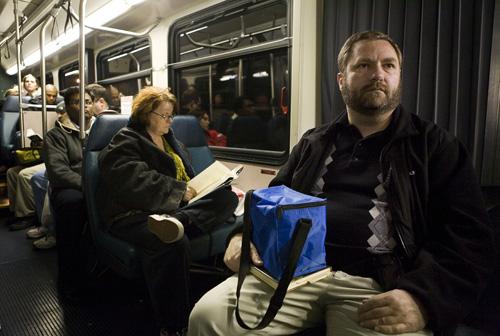Volatile economy concerns Americans

Rennie Sawade takes the bus home from his job as a programmer in downtown Seattle, Wednesday, Feb. 13, 2008. Sawade, who lives in Woodinville, Wash., recently started taking the bus home to save money. Stephen Brashear, The Associated Press
Feb 18, 2008
Last updated on May 12, 2016 at 09:44 p.m.
Even when experts were declaring the economy healthy, many Americans voiced a vague, but persistent dissatisfaction.
True, jobs were relatively plentiful over the last few years. It was easy to borrow and very cheap. The sharp rise in the value of homes and plentiful credit cards encouraged a nation of consumers to get out and buy. But to many people, something didn’t feel right, even if they couldn’t quite explain why.
Now the economic tide is receding, and the undertow that was there all along is getting stronger.
Take away the easy credit and consumers are left with paychecks that, for most, haven’t nearly kept pace with their need and propensity to spend.
Get The Daily Illini in your inbox!
The frustration of $3 gas and $4 milk, the worries about health care costs that have risen four times the rate of pay, become much more real.
Americans’ declining confidence in their economy is triggered by a storm of very recent pressures, including plunging home prices, tightening credit, and heavy debt. But it is compounded by anxiety that was there all along, the result of a long, slow drip of worries and vulnerabilities.
“The economy is currently in recession or arguably close to recession and that’s certainly weighing on the collective psyche,” says Mark Zandi, chief economist of forecaster Moody’s Economy.com. “But … I do think there is an increasing level of angst that is more fundamental and is not going to go away even when the economy improves.”
Much of that anxiety is the uncomfortable, but expected jolt of the economic roller coaster. During a downturn, people become less confident about keeping their jobs or being able to find new ones, meeting household expenses and about the prospects for the future.
But there may be more to it than just cyclical ups and downs.
What does the economic future hold? Many Americans feel increasingly unable to answer that question with assurance, and they appraise it with a sense that they are less in control of the outcome.
“There were tail winds behind” the growth in consumer spending over the last 25 years, said Andrew Kohut, president of the Pew Research Center. “Now there are headwinds.”





